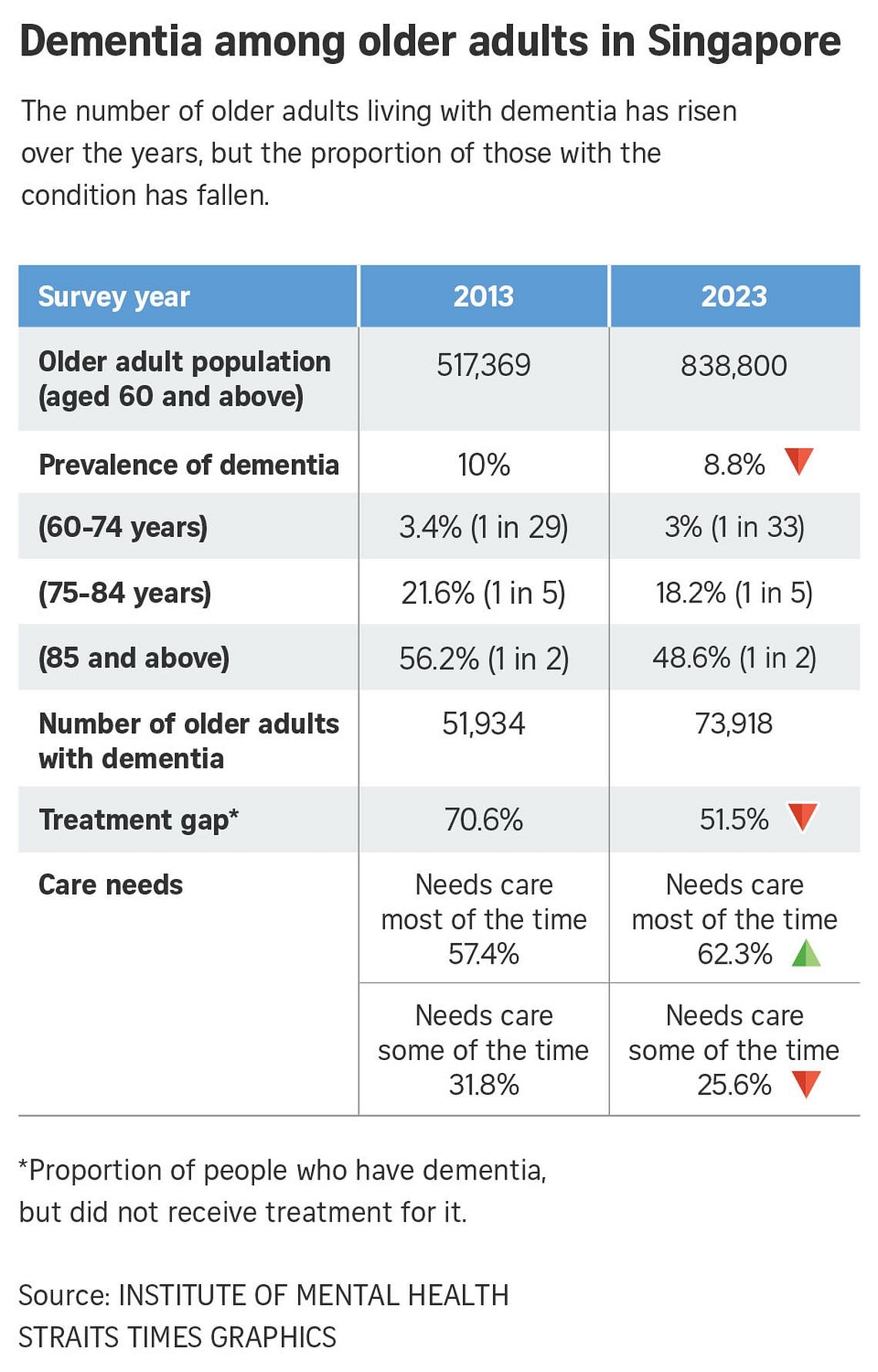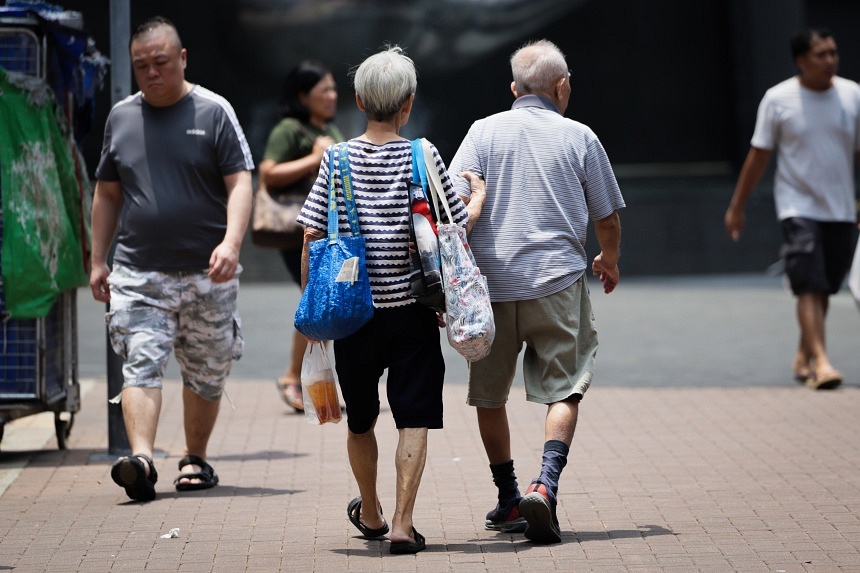SINGAPORE – A nationwide study has found that the prevalence of dementia among older adults aged 60 and above in Singapore has dropped to 8.8 per cent – or one in 11 people – from 10 per cent about a decade ago.
Increased employment among this group, higher education and a lower stroke prevalence contributed to the fall, said the Institute of Mental Health (IMH), which is behind the study.
Dr Mythily Subramaniam, assistant chairman of IMH’s medical board for research and a co-investigator of the study, said: “We observed that more older adults in Singapore were employed and had higher education in 2023 compared with 2013.
“Furthermore, the prevalence of stroke, which is a risk factor for dementia, has decreased from 2013 to 2023, according to the Wise study.”
“When you’re working, you’re constantly stimulating your brain. There are other important protective factors as well... (such as) a social network around the place that we work in,” she added.
Professor Chong Siow Ann, a senior consultant in the research division and psychosis department at IMH, said that over the past decade, the Government has introduced a slew of initiatives to promote active ageing, and the early detection and treatment of chronic conditions that could contribute to cognitive impairment.
These efforts may have helped to bend the curve.
The findings, on how common dementia is and its impact on caregivers, from the second Well-being of the Singapore Elderly (Wise) study were released on Aug 28.
The researchers surveyed 2,010 Singapore citizens and permanent residents from March 2022 to September 2023, and nearly 1,800 caregivers. The face-to-face interviews lasted an average of one hour and 53 minutes each.
However, as the country’s population rapidly ages, the number of people with dementia will grow and pose a challenge to their caregivers and the healthcare sector.
The Wise study showed that the number of older adults with dementia rose from 51,934 in 2013 to 73,918 in 2023, due to the increase in the adult population.
The good news is that more cases were likely being diagnosed and treated, as the treatment gap of dementia showed an improvement of some 19 percentage points since the last study.
The study also found that only 51.5 per cent of seniors who met the criteria of dementia were not diagnosed and treated, compared with 70.6 per cent in 2013.
Dr Ng Li Ling, a senior consultant in psychological medicine at Changi General Hospital, said there are more services to help with diagnosing dementia, as awareness has improved.
“And when you make the diagnosis of dementia, it is not only about using medication, especially if the diagnosis is Alzheimer’s dementia, but also the psychosocial interventions that come in, the activities, the issue about supporting caregivers.”
“What has helped over these 10 years… is the number of services that are available to people with dementia, and they’re not only supporting them in hospitals, but also supporting them in the community.”
These include daycare centres and home-based services, she added.

The Ministry of Health has been ramping up dementia capability and capacity in hospitals and the community. For instance, the capacity of dementia daycare centres increased from 3,700 places in 2019 to 4,700 in 2023, it said.
There are also dementia services at 16 polyclinics as at the end of 2023, up from 13 in 2019.
The study found that retirees and housewives were about 11 times and nine times, respectively, more likely to have dementia compared with those who were employed.
Individuals with a history of stroke or depression were, respectively, 6.5 times and nearly three times more likely to have dementia.
The prevalence of dementia among Indians and other ethnicities here was slightly higher than that among the Chinese.
The risk increases with age, with the study showing that those above 85 were about 11 times more likely to have dementia than those in the 60 to 74 age group.
Dementia is the largest single contributor to the disability and care needs in the older adult population.
According to Alzheimer’s Disease International, someone in the world develops dementia every three seconds.
The number of cases is expected to reach 78 million in 2030 and 139 million in 2050.
Increased burden on caregivers of people with dementia
The Wise study also found that caregivers of people with dementia had a significantly higher care burden than caregivers of those without dementia (37 per cent versus 18 per cent).
Around 88 per cent of the older adults with dementia required care, compared with 15.6 per cent of those without the condition. Furthermore, 62 per cent of older adults with dementia required care “most of the time”, compared with 5 per cent of those without it.
Ms Evelyn Chng, 54, said she developed anxiety and had panic attacks not long after becoming her mother’s primary caregiver about 12 years ago, when the elderly woman was diagnosed with dementia. She also faced other challenges at that time, including caregiving for her son who has a mental health condition, and suffered from burnout.
“My health was very bad. I was drowning. Mentally, I kept getting panic attacks and couldn’t sleep well,” said Ms Chng. She is the central cluster head at non-profit organisation Caregivers Alliance Limited.
Her mother, who is now 88 and lives on her own with a domestic helper, goes to a dementia daycare centre on weekdays. On weekends, Ms Chng may take her out for dementia-related activities and will look after her when the helper has a day off.
Ms Chng also manages her mother’s finances and daily needs, and takes her to medical appointments.
On the prevalence of depression among older adults, the study found that this reached 4.4 per cent, compared with 3.7 per cent in the previous study.
Those of Indian ethnicity have higher odds of being depressed than those of Chinese ethnicity. The same goes for individuals who were divorced or separated compared with married couples, and those with below-primary education compared with tertiary-educated people.


